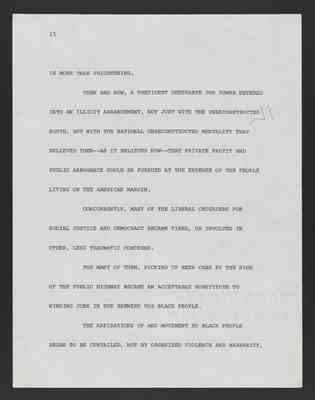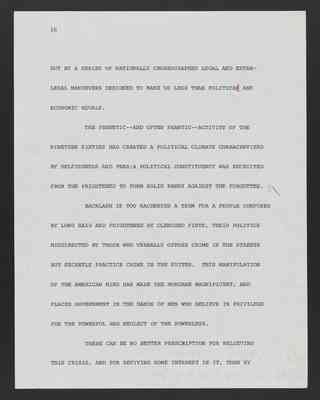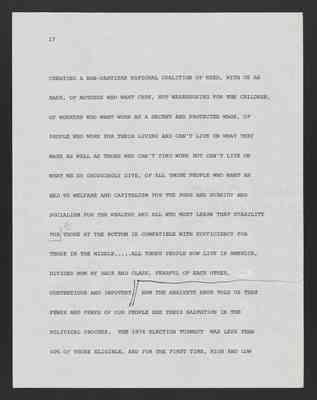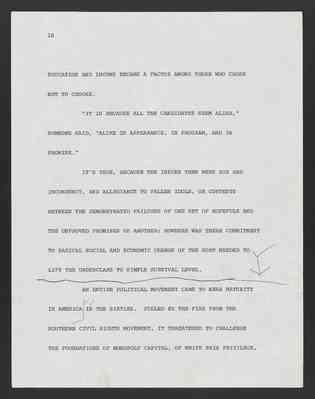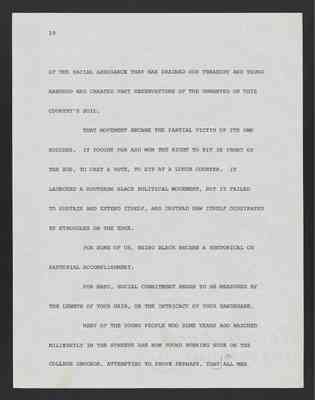Pages
21
15
is more than frightening.
Then and now, a President desperate for power entered into an illicit arrangement, not just with the unreconstructed14 south, but with the national unreconstructured mentality that believed then -- as it believes now -- that private profit and public arrogance could be pursued at the expense of the people living on the American margin.
Concurrently, many of the liberal crusaders for social justice and democracy became tired, or involved in other, less traumatic concerns.
For many of them, picking up beer cans by the side of the public highway became an acceptable substitute to winning jobs in the brewery for black people.
The aspirations of and movement by black people began to be curtailed, not by organized violence and barbarity,
22
16
but by a series of nationally choreographed legal and extra-legal manuevers designed to make us less than politicanl and economic equals.
The frenetic -- and often frantic -- activity of the nineteen sixties had created a political climate characterized by selfishness and fear; a political constituency was recruited from the frightened to form solid ranks against the forgotten.15
Backlash is too hackneyed a term for people confused by long hair and frightened by clenched fists, their politics misdirected by those who verbally oppose crime in the streets but secretly practice crime in the suites. This manipulation of the American mind has made the mundane magnificient, and placed government in the hands of men who believe in privilege for the powerful and neglect of the powerless.
There can be no better prescription for relieving this crisis, and for reviving some interest in it, than by
23
17
creating a non-partisan national coalition of need, with us as base, of mothers who want care, not warehousing for the children, of workers who want work at a decent and protected wage, of people who work for their living and can't live on what they make as well as those who can't find work but can't live on what we so grudgingly give, of all those people who want an end to welfare and capitalism for the poor and subsidy and socialism for the wealthy and all who must learan that stability for16 those at the bottom is compatible with sufficiency for those in the middle ... all those people now live in America, divided now by race and class, fearful of each other, contentious and impotent.
Now the analysts have told us that fewer and fewer of our people see their salvation in the political process. The 1974 election turnout was less than 40% of those eligible, and for the first time, high and low
24
18
education and income became a factor among those who chose not to choose.
"It is because all the candidates seem alike," someone said, "alike in appearance, in program, and in promise."
It's true, because the issues then were age and incumbency, and allegiance to fallen idols, or contests between the demonstrated failures of one set or hopefuls and the unproved promises of another; nowhere was there commitment to radical social and economic change of the sort needed to life the underclass to simple survival level.
An entire political movement came to near maturity in America17in the Sixties. Fueled by the fire from the southern civil rights movement, it threatened to challenge the foundations of monopoly capital, of white skin privilege,
25
19
of the racial arrogance that has drained our treasury and young manhood and created vast reservations of the unwanted on this country's soil.
That movement became the partial victim of its own success. It fought for and won the right to sit in front of the bus, to cast a vote, to sit at a lunch counter. It launched a southern black political movement, but it failed to sustain and extend itself, and instead saw itself dissipated by struggles on the edge.
For some of us, being black became a rhetorical or sartorial accomplishment.
For many, social commitment began to be measured by the length of your hair, or the intricacy of your handshake.
Many of the young people who some years ago marched militantly in the streets are now found running nude on the college grounds, attempting to prove perhaps, that18 all men
